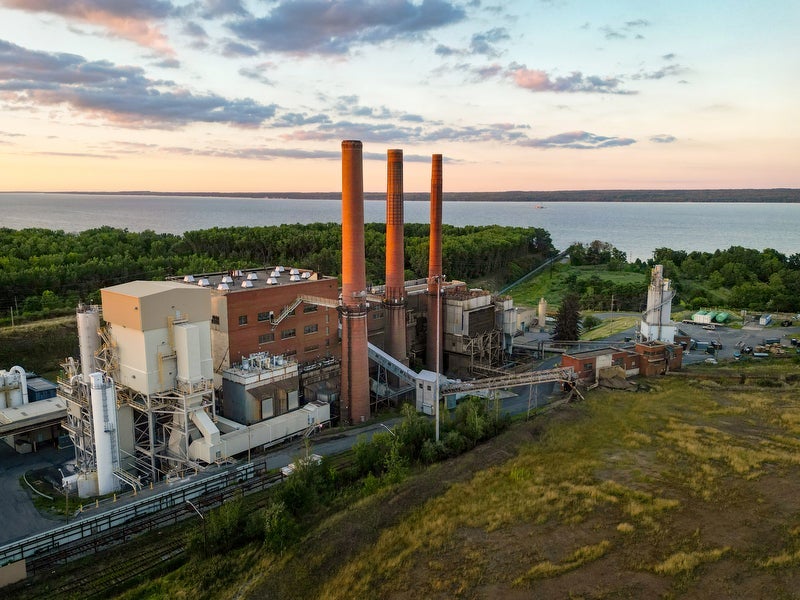Crypto Miners Bought Their Own Power Plant. It’s a Climate Disaster.
The plant's air permit application was denied after community members fought back, with help from Earthjustice.

This page was published 2 years ago. Find the latest on Earthjustice’s work.
A New York State judge agreed with environmental regulators that a company’s operation of a fossil fuel power plant to mine cryptocurrency was inconsistent with the state’s landmark 2019 climate law.
Though the court fight is ongoing, the decision reaffirms a hard-fought victory for community groups in upstate New York and for Earthjustice lawyers working to stop a new industry from unwinding major progress in retiring fossil fuel power plants. What follows is their story.
***
It’s a June morning in 2022, so early that most homes on Seneca Lake in upstate New York are filled with only the murmur of water lapping on the wooded shores. But in Yvonne Taylor’s house, there’s the hum of grassroots organizing to fight one of the biggest new threats to climate.
Tap, tap, tap.
Taylor is reaching out on Facebook to a stranger in Pennsylvania who posted about the cryptocurrency mining industry coming to her town.
“We’d love to talk with you about this,” Taylor writes. “We’re being impacted by Bitcoin mining in our community too, and [we] are forming a national group of people who are experiencing the harmful effects of this industry.”
The harm from certain types of cryptocurrency is that the production of new virtual coins – known as “mining” – requires a shocking amount of electricity consumption. When that power is produced with fossil fuels, it creates a lot of local pollution and climate emissions.
Bitcoin mining is so energy intensive it’s driving demand for new fossil fuel plants or giving old plants a new life.
At Seneca Lake, a private equity firm bought the once-mothballed Greenidge coal plant in 2014 and converted it to a fracked gas plant. In 2020, that firm started a commercial cryptocurrency mining operation by plugging thousands of computers directly into the plant to mine Bitcoin. The move turned out to be a blunder. An industry that had flown below the radar – too novel to regulate – suddenly stepped into a community with deep experience fending off environmental threats.
Taylor, a speech therapist whose family has lived on the lake for seven generations, first got mobilized around banning fracking in the region. Then, when a company came up with a scheme to store 88 million gallons of liquified petroleum gas in salt caverns along the lake, she and others beat that back with Earthjustice’s legal help.
The lake, Taylor says, “has really been the only constant I’ve ever had in an otherwise very tumultuous life. I am as fierce about protecting it as a mama bear would be about her cub.”

Yvonne Taylor, photographed in Seneca Lake, where her family has lived for seven generations. (Lauren Petracca for Earthjustice)
So, in 2020, when Taylor realized what was going on up at the local power plant and learned that global Bitcoin mining uses more electricity than some medium-sized European nations, she knew exactly whom to turn to for help.
She called Earthjustice.
New Fight, Old Foe
Taylor’s tip-off made its way to Mandy DeRoche, a new deputy managing attorney at Earthjustice.
A former securities and commercial litigator experienced with corporate disclosures, DeRoche had just the right skills to tackle a complex new climate threat.
Taylor and other local partners brought DeRoche up to date on their environmental watchdog efforts. In 2017, the Greenidge power station restarted as a gas-fired plant. It operated sporadically for a few years, providing power to the grid at times of peak demand.
Then, the watchdogs noticed unusual moves afoot at the plant. They learned of permit applications to construct buildings to house computers for a “data center” and to operate “behind the meter,” meaning the power wouldn’t go to the grid for public use but directly to this data center.
But this was no ordinary data center.
In 2020, the power plant ramped up operations. Those nearby began to hear a low droning noise, described by one resident as the sound of a jet that never lands. The noise came from fans cooling computers. Air pollution levels jumped.
Residents were stunned and scrambled to understand what exactly had moved into town.

Mandy DeRoche, left, deputy managing attorney in the Coal Program, talks with Earthjustice senior attorney Meagan Burton during a staff meeting in New York City. (Kholood Eid for Earthjustice)
DeRoche knew from her earlier career where to get better information than that provided by traditional environmental regulatory system. The buyers of the power station, Greenidge Generation LLC, were going public through a complex reverse merger. That meant they would have to make disclosures to the Securities and Exchange Commission and investors.
The details dispelled any hopes that the mining was just a side hustle. The plant operated for just 48 days in 2019, producing the equivalent carbon emissions of roughly 7,700 gas-powered cars driven for a year. The next year, the plant operated 343 days and emitted the equivalent of more than 44,500 cars. By the end of 2020, the company was running approximately 6,900 miners. More mining machines have been added since as the company builds up to a planned 32,500 machines.
The plant’s air permit, a replica of when it was powering local homes and businesses in prior decades, gave the plant’s new investors significant runway to pollute just to mine cryptocurrency for themselves. The company also had ambitions to scale this model elsewhere.
Earthjustice had spent decades shutting down more than 100 coal plants. DeRoche glimpsed the outlines of a new industry that could raise plants back from the dead and also increase the operations of other fossil-fueled plants across the country.
“Greenidge Generation LLC gave other retired, retiring, or peaking plants a roadmap of how to come back online or pollute more, and how to recruit investors, how to go public on NASDAQ,” she says.
Shot Heard Round the Blockchain
DeRoche and the Sierra Club Atlantic Chapter sent a letter in 2021 to the New York State Department of Environmental Conservation pointing out that if the type of energy-draining mining seen at Greenidge took off and was powered by fossil fuels, the state had no hope of meeting its newly mandated climate emission cuts. The agency could, the letter noted, reject the power plant’s air permit, which was coming up for renewal.
Her phone promptly blew up with calls from journalists drawn to crypto mining controversy. Bitcoin, the oldest and most famous cryptocurrency, inspires fervent followers and relentless critics.
DeRoche refused to be drawn in. “Crypto is a new and shiny thing that brings press attention, but our focus remains on pollution and energy use,” says DeRoche. “We see a power plant running all the time that wasn’t before. We don’t support power plants coming back from the dead, or operating any more than they absolutely need to.”
Practically, that means Earthjustice’s concern is limited to a specific type of cryptocurrency mining called “proof-of work” that is used principally by Bitcoin. Many other coins use far less energy.
The narrow focus still unleashed intense pushback from Bitcoin believers. Local watchdogs faced threats from people who “are almost evangelical about proof-of-work crypto mining,” says Taylor. “We became actually very fearful for our safety. We have installed an extensive security system in our home as a result of this.”

Bitcoin mining machines in a warehouse at the Whinstone US Bitcoin mining facility in Rockdale, Texas, the largest in North America. Operations like this one have been boosted by China’s intensified crypto crackdown that has pushed the industry west. (Mark Felix / AFP via Getty Images)
The media moment also brought forth new information and allies. Journalists and local partners surfaced other mining outfits after operations surged in the U.S. following a ban in China, sending miners scurrying to find cheap, fast energy. Residents in other communities dealing with cryptocurrency mining operations began reaching out to Seneca Lake activists and Earthjustice.
Many miners are located in states where Earthjustice has experience fighting dirty power plants, including Kentucky, Indiana, Montana, Pennsylvania, and New York.
Most miners are plugging directly into electric grids, some of which are very dirty, like Kentucky’s, which is approximately 70% coal-powered. Miners can often get sweetheart prices from utilities through power purchasing agreements or through preferential rates. Earthjustice is beginning to challenge these deals, which leave leave ordinary people and local businesses with higher electricity bills and more pollution.
In addition, crypto mining has been ramping up quickly in oil and gas fields – miners bring shipping containers filled with computers right up to well heads.
A Slowdown Showdown
Sensing legislators and regulators needed more time and information, Earthjustice and allies pushed New York state to pass a partial moratorium.
The idea: hold off on permitting crypto mining at fossil fuel plants for two years while the state conducts a study on the environmental effects of cryptocurrency mining – particularly with an eye to meeting a 2019 state law called the Climate Leadership and Community Protection Act. The CLCPA commits New York to serious greenhouse gas reductions.
The crypto mining industry would have none of it. They retained nearly every lobbying firm in Albany, recounts Earthjustice’s Liz Moran, who had the job of going toe-to-toe with that army of suits.
“I heard from some legislative offices that they would hear from a lobbyist representing a crypto company at least three times daily,” says Moran. “That was intimidating.”
The only way to beat them back, she realized, was with people power.

Earthjustice policy advocate Elizabeth Moran, photographed in the New York State Capitol in Albany. (Patrick Dodson for Earthjustice)
She arranged for grassroots advocates from groups like Taylor’s Seneca Lake Guardian, Fossil Free Tompkins, Committee to Preserve the Finger Lakes, and many others to travel to Albany, or join calls or virtual meetings, to share their personal stories. Then, in the final days, they ramped up calls to key legislators around the clock. Support for the moratorium would flip – and flip back.
The fight went down to the final minutes of New York’s legislative session, finally passing around 2:30 a.m. on June 3. The governor signed it into law in November.
“It was David vs. Goliath. It really felt like the little guys won here,” says Moran.
Back at the Lake
Victory wasn’t complete for residents around Seneca Lake, however. The new law would not directly impact Greenidge because it exempts miners with permit applications that predate any moratorium.
But great news came when the state decided on June 30 to deny Greenidge’s Title V air permit. Statewide advocates had pumped up the volume, submitting some 4,000 comments, 98% of them against renewing the permit, including Earthjustice’s own 57-page technical and legal comments.
“My phone started lighting up with ‘Title V air permit denied’ messages. I literally dropped my phone,” says Taylor. The outburst startled her partner. “I said, ‘We did it, we did it, they denied the permit!’ We both jumped up and down hugging each other and laughing for a bit.”
Greenidge is challenging the denial of the air permit; Earthjustice and the state environmental agency will defend it. Greenidge continues to operate in the meantime, but the exposure and containment of a pernicious new industry has begun. And more challenges by Earthjustice are coming.
Originally published on November 28, 2022.
Established in 2008, Earthjustice’s Northeast Office, located in New York City, is at the forefront of issues at the intersection of energy, environmental health, and social justice.